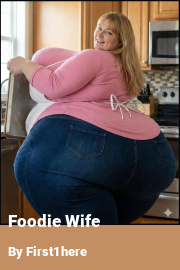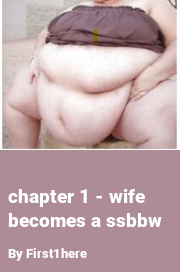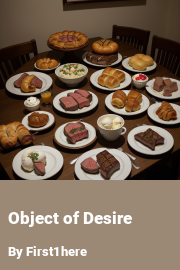Chapter 1 - Eat for me
Scene #1The campus quad on game day felt, to Bob, like a party where everyone else was already drunk. The air smelled like overcooked bratwurst and soggy lawn, and every surface—not just tables but benches, mailboxes, and even the planters in front of the administration building—bristled with tailgate refugees. Bob, six-three and built for the line but doomed to special teams by a freshman-year ACL, moved through the crowds with practiced sidesteps and polite nods. If he was invisible, it was only because at U of M, every other guy seemed to have been built in the same factory: wide shoulders, wider thighs, meathead haircut you could set your watch by.
He spotted Susan standing near the DJ booth, clutching a plastic Solo cup with both hands like it was full of nitroglycerin. She wore her cheer jacket—bright white, stitched in navy and gold at the seams—and her hair in a high, aggressive ponytail that looked engineered for maximum bounce. When she saw him, she did a little hop and ran up, nearly colliding with a weedy undergrad who carried a tray of cupcakes at chest height.
“Did you see those idiots over by North Dorm?” she asked, not even waiting for hello. “They made a slip-and-slide out of garbage bags and there’s, like, blood on the grass. Actual blood. Freshman are so dumb.”
Bob grinned. “I think they’re just pre-medicating for the loss.”
Susan made a face—pursed lips, eyes wide, the works. “We’re not gonna lose,” she declared, “not with you on the field. You’re all anyone can talk about in Bio Lab, by the way.”
He tried to imagine the brittle-voiced teaching assistant talking about football. “Wasn’t me who punted a squirrel last week,” he said, trying for humble. “But I’ll take it.”
The DJ fumbled his transition into “Mr. Brightside.” Susan’s head ticked to the beat. She looked at Bob like she was sizing up a secret, or maybe trying to decide whether to tell him something that would change everything. “Anyway, I told my sisters you’d come by for dinner after the game. Dad’s grilling. No, it’s not weird, and no, you’re not allowed to say you’re busy.”
It was only their fourth week of officially dating, but Bob had already catalogued Susan’s habits: her complete lack of chill, her fondness for cheese puffs, the way she pronounced “gnocchi” with a hard “k” just to bother the server at Olive Garden. Dinner with her family was just another step. He wasn’t afraid of parents—his own had divorced young and quick, and he’d survived plenty of tense Thanksgivings as the neutral kid in the room. If anything, he was curious.
The game ended in an expected blowout, with Bob getting in for two unremarkable special teams plays and then standing on the sidelines, helmet off, helmet on, helmet off again, like a guy in a romantic comedy who keeps missing his cue. Susan found him after, sneaking through the locker room exit with her badge. She held up a tissue-wrapped box. “Victory cookies,” she announced. “They’re mostly for you, but I already had three.”
He inhaled the aroma: warm, sweet, heavy on the butter. “You ever eat actual food, or just sugar?”
“Sugar is food,” she said. “It’s the only thing that makes being alive worth it.”
Dinner was at her parents’ place: a two-story Colonial on a strip of land just outside town, technically rural but close enough to the highway that you could hear the trucks at night. The drive wound through elms and maples just starting to yellow, the last shreds of September holding out against the gray. Susan filled the silence with stories about her sisters—always plural, as if they came in a set—and about her mom’s obsession with kitchen gadgets.
“They’re all older than me,” she said, “and they think I’m the baby even though I’m, like, way smarter than them. Nicole’s the oldest, then Morgan, then Zoe, then me. You’ll love them.”
“I’m guessing they’re all tiny and athletic like you,” Bob said.
Susan snorted. “If by ‘athletic’ you mean ‘can eat an entire pizza and not apologize,’ then yes. They’re also super-competitive, so if Nicole tries to arm-wrestle you, just let her win. Trust me.”
The house was lit up from inside, every window glowing. Susan parked in the driveway and immediately popped her seatbelt with the energy of someone escaping captivity.
She was right about the sisters. Nicole, the eldest, opened the door with a glass of red wine elegantly cradled in her hand. Her striking features framed a radiant smile that lit up her face—high cheekbones, full lips, and sparkling green eyes that seemed to dance with mischief. Long, wavy hair cascaded over her shoulders, catching the warm light from inside the house. As she assessed Bob with a playful gaze, it felt less like an inspection and more like a challenge, as if she were sizing him up for a game only she knew the rules to.
“So you’re Bob,” she said. “Hope you brought a helmet.”
Morgan and Zoe stepped into view, a striking duo that seemed to share more than just genes. Both had silky, straight brown hair that cascaded down their shoulders, framing their heart-shaped faces adorned with high cheekbones and full lips that curved into inviting smiles. Their eyes sparkled with a hint of mischief, drawing attention to the warmth and charm radiating from their expressions. Morgan's figure was elegant, her curves subtly accentuated by a fitted top that highlighted her slim waist, while Zoe's silhouette was equally captivating, her hourglass shape emphasized by the way her shirt clung just right. The two sisters exuded an effortless beauty, their playful banter and shared laughter creating an atmosphere that felt both welcoming and electric.
Inside, the air was thick with the smell of roasted meat, garlic, and something deeper—maybe brown sugar. Bob followed Susan through a front hall lined with family photos. In every shot, the women of the family looked magazine-perfect: slim, smiley, hair on point even in what were clearly candid shots. The men were another story. In a Christmas photo from a few years ago, Susan’s father took up almost the entire left side of the frame, his cheeks ruddy and his neck pressed tight against the collar. In another, Nicole’s husband sported a chin that melted into a spare tire above his shirt. Zoe’s boyfriend, in the beach photo, looked sunburned and doughy, his swim trunks struggling against the pressure of his hips.
They moved to the kitchen, where Susan’s mother was wrist-deep in mashed potatoes. She looked exactly like a future version of Susan: same eyes, same mouth, even the same high ponytail, only streaked with gray. “Hi, honey,” she called. “And you must be Bob! Do you like brisket? I hope you like brisket.”
“He’s very into protein,” Susan said, making a face. “He puts peanut butter in his oatmeal.”
“Nothing wrong with a hearty appetite,” her mother said. “You’re a growing boy.”
Susan’s father strode into the room moments later, a sweating can of diet soda clutched in his hand. The apron he wore, emblazoned with “King of the Q” in bold letters, stretched snugly across his ample belly, which protruded well beyond the fabric’s hem. His arms were thick and meaty, resembling sausages, and they strained against the sleeves of his shirt, which was tucked awkwardly beneath the apron. A generous double chin rested on his chest, giving him a jovial appearance, while his round face was framed by a tuft of unruly hair that seemed to defy gravity. Despite his size, there was a spark in his eyes—lively and a touch mischievous—as if he was perpetually poised to share a joke that might just toe the line of propriety. It was clear he relished his role as the family’s culinary king, even if his throne was more about comfort than grandeur.
“Welcome to the chaos,” he said, offering Bob a hand. His palm was clammy and warm, but the handshake was solid.
Dinner was an ordeal in the best sense. Brisket, potatoes, a basket of yeast rolls, two salads—one leafy, one a jiggling mass of lime gelatin. Everyone talked at once, overlapping stories, cutting each other off, even heckling their own punchlines. Bob tried to keep up, but the conversation shifted so fast he often found himself two beats behind. The only time everyone paused was to eat, and even then, the forks moved in a blur.
He’d never witnessed anyone devour food like this family. Plates were piled high, seconds came without hesitation, and thirds appeared before you could even finish your thought. Bob kept up with their pace at first, but soon fell behind, a flush of embarrassment creeping in as his stomach protested against the onslaught. Across from him, Susan gleefully shoveled mashed potatoes into her mouth, her eyes sparkling with delight. She paused only to grab a hefty chunk of brisket, dipping it generously into the rich pool of sauce on her plate.
As he watched, Bob noticed the wives occasionally lean over to feed their husbands enormous bites, their laughter mingling with the clinking of forks. They would tenderly rub their husbands' bellies, coaxing them to eat more, their gestures filled with affection and a hint of mischief. It was a ritual of indulgence, a celebration of appetite that made Bob feel both awed and slightly overwhelmed.
Morgan poured herself another glass of wine and leaned toward Bob. “So how serious is this?” she asked, eyes gleaming. “Should I start practicing my wedding toast?”
Zoe groaned. “Give him some air. You’re scaring him.”
“I’m not scared,” Bob said, though he wasn’t entirely sure that was true. There was an energy here—something aggressive and almost feral in the way they all regarded him. Like a pack of wolves, only cuter and much better dressed.
After dinner, Bob helped clear the table, making awkward small talk with Susan’s mother while the sisters vanished into the den, giggling. Her mom scraped leftovers into a giant Tupperware and handed it to him. “You’ll need this for after practice,” she said, tapping the lid with a wink. “Susan tells me you work hard.”
He mumbled thanks and stowed the container in the fridge.
“Did you notice how much your father ate?” Bob whispered to Susan as they left.
She shrugged. “He’s always been a big guy. It runs in his side.”
“Just seemed like a lot. Everyone, actually.”
Susan giggled. “We love food, what can I say? You’ll fit right in.”
On the drive back to campus, Susan curled into the passenger seat, her feet up on the dash. She picked at her teeth with a toothpick and talked about her plans for med school, how she wanted to be an ER doctor because she liked high-pressure situations. Bob liked that about her. She was never fake, never hesitant.
They had their first real fight a month later, over something stupid—he forgot to call her back after a late practice, she accused him of ghosting, he said she was overreacting. The argument fizzled before it had a chance to burn, and the next morning she appeared outside his dorm with a sack of breakfast burritos and a peace offering written on a sticky note: “Sorry for being a psycho. Still love you.”
From there, it was a blur of midterms and Friday night Netflix, cold walks across the quad, and endless cafeteria meals. When the snow started, Susan dragged him to the campus rec center to watch basketball games from the bleachers, half the time ignoring the action to gossip about people in her classes.
He saw her family again at Thanksgiving. The spread was immense: turkey, ham, lasagna, five kinds of pie. This time, there were two new faces at the table—Zoe’s boyfriend, a pale grad student who barely spoke, and Morgan’s roommate, a transfer from Ohio State. Both looked mildly terrified as the meal progressed, but by the second helping, even the grad student loosened up and attacked the mashed sweet potatoes like he hadn’t eaten in days.
Again, Bob was struck by the gender divide: the women slender and energetic, the men broad and a little soft at the edges. Even Zoe’s boyfriend, who seemed delicate at first, packed away more food than Bob thought possible for a guy who wore jeans a size too small.
After the meal, Bob stood with Susan on the back deck, watching the night gather over the woods. She shivered and pressed against him.
“Don’t take this the wrong way,” he said, “but your family kind of, I dunno, goes hard.”
She laughed, high and sharp. “I warned you. You should see what Christmas is like.”
“Maybe I will,” he said, surprised at how much he meant it.
She bumped his hip. “Are you, like, worried? That I’ll get you fattened up like my dad?”
He put an arm around her. “I’m not worried. I’m tough. Besides, you’re the one who eats all the cookies.”
She grinned, lips blue in the porch light. “That’s what you think.”
He almost said “I love you,” but it caught in his throat, half-swallowed by the cold. He settled for squeezing her tighter.
The rest of senior year passed in a blur. Susan got her med school acceptance. Bob played his last game, knees aching but pride intact. In April, he proposed on a picnic table in the shadow of the stadium, ring tucked in a cupcake. She said yes with a mouthful of frosting.
Bob’s parents flew in for graduation. He watched as Susan introduced herself, handshake strong, smile practiced. He saw the way she looked at him—like he was the only solid thing in a room full of quicksand. He felt lucky, which was a word he never really liked, but that seemed exactly right.
If he noticed that he was eating more, or that his face had softened in the last few months, he blamed the late-night study sessions and Susan’s relentless baking. The thing with her family—the odd contrast, the way the men seemed to balloon while the women never changed—became a running joke between them. He didn’t take it seriously, because why would he?
When he looked at Susan, he saw the rest of his life lined up, neat and perfect. Whatever came next, he was ready.
# Scene 2
Marriage, as Susan described it in her vows, was “a series of happy little accidents.” The phrase resonated with Bob, not just because it echoed her mother’s whimsical nature, but also because his own philosophy leaned more toward, “Let’s see how long we can avoid a fiery crash.” The first surprise came swiftly when Susan transformed their two-bedroom rental into a cozy haven of togetherness. The living room overflowed with thrift-store pillows in vibrant colors and an assortment of board games stacked haphazardly on the shelves. Every wall brimmed with candid snapshots and quirky art projects from her childhood, each piece telling a story of laughter and warmth. In the bedroom, she insisted on a king-size bed (“We’re both sprawlers,” she explained with a grin), dressing it in a comforter so plush that Bob often found himself drifting off unexpectedly. To top it all off, Susan surprised him with a huge, comfortable recliner in a deep shade of blue, perfectly positioned near the window. It became his favorite spot to sink into after a long day, the fabric soft against his skin as he settled in with a book or a plate of Susan's latest baked treat.
The kitchen, though, was Susan’s domain in a way that felt almost sacred. Within a week she had filled the cupboards with jars of specialty flours and an army of spice bottles, each labeled in her sharp, neat print. She bought a stand mixer with a brushed steel bowl and a basket of attachments that looked like medieval torture devices. The fridge always bulged with leftovers—frittata, stroganoff, an entire lasagna Susan baked “just to see if she could do it.” The freezer was an arctic graveyard of muffins and cookies, all labeled by date and flavor.
Bob tried to be helpful, but Susan was relentless. “Sit,” she’d say, pushing him onto a kitchen stool. “Just let me do this.” She moved around the kitchen with a single-mindedness that, if Bob was honest, he found hot as hell. He wasn’t used to being cared for in this way: food arriving at his elbow, hot and beautiful, without any effort on his part. Susan never measured; she just poured and sprinkled until it felt right, licking the batter off her fingers before plunging her hands into the next phase.
Her specialty was dessert. Sometimes it was cheesecake, sometimes it was seven-layer brownies, sometimes it was something with a French name Bob couldn’t pronounce. What surprised him most was the volume. Susan made enough for a dinner party every night, and every night, she insisted he clean his plate.
“You’re not gonna let me eat all this by myself,” she said one night, sliding a slab of black forest cake across the table.
Bob laughed. “It’s physically impossible for me to eat this much. You realize that, right?”
She eyed him over the rim of her wine glass. “Not with that attitude.”
He tried to resist, but it was pointless. Each time he finished a serving, she’d beam, then immediately cut him another slice. By the end of the week, his body felt sluggish, his gut tight under his t-shirt. He told himself it was just the shock of moving in together, that his appetite would even out once they settled into a routine.
But the portions didn’t shrink. If anything, they grew. If Bob made a joke about being too full to move, Susan would grin and say, “That’s how you know you did it right.” She started making breakfast before work—towering stacks of pancakes, “breakfast lasagna,” biscuits drowned in sausage gravy. Even on weekday mornings, when Bob barely had time to brush his teeth before the gym, Susan insisted on sending him out with a Ziploc bag of scones or a wedge of banana bread. The idea that food was a language of love was not new to Bob, but he’d never seen it spoken so fluently.
It should have made him uneasy, but mostly, it was thrilling. There was an urgency to Susan’s feeding that reminded him of their early dating days: the sly looks, the bursts of laughter, the way she always found a way to touch him—even if it was just a quick brush on the thigh or a playful shoulder bump as she handed him a napkin. Sex was better now, too. There was a softness to their new life, a willingness to be goofy and greedy and loud.
The first time Susan brought food into the bedroom, it was on a dare. She had made a tray of tiramisu—her mother’s recipe, the one she always made for holidays—and while they watched reruns on the couch, she fed him spoonful after spoonful, teasing him with “open up, honey” until he almost choked laughing.
When they finally tumbled into bed, breathless and tangled in each other, Susan paused for a moment. She slipped off the covers and padded to the fridge, her excitement palpable in the air. A moment later, she returned with the remaining tiramisu nestled in a delicate ceramic dish, its layers glistening under the soft glow of the bedside lamp. Setting it on the nightstand, she climbed onto Bob, her body pressing against his with a heat that sent shivers down his spine.
With a playful glint in her eye, she scooped a generous bite of the creamy dessert and brought it to his lips, the rich mascarpone and coffee mingling tantalizingly in the air. She didn’t hesitate, not even as they shed their clothing, her movements becoming more fervent. Each time he thrust upward, she would pause, her breath quickening, and dip the spoon into the silky cake, laughing softly as she fed him another mouthful. The sweet treat smeared across his chin, and she leaned down, licking the remnants away, her eyes sparkling with mischief and desire. The rhythm of their bodies matched the rhythm of her feeding, each thrust igniting her passion further, the act of nourishing him blending seamlessly with the intimacy they shared.
Bob felt himself getting dizzy—half from the sugar, half from Susan’s complete lack of shame. She seemed to get off on it, the messier the better. Afterward, as he lay catching his breath, she licked the remnants off his chest and whispered, “See? Everything tastes better in bed.”
Romance
Feeding/Stuffing
Sexual acts/Love making
Romantic
Spoilt
Male
Straight
Weight gain
Wife/Husband/Girlfriend
2 chapters, created 3 months
, updated 3 months
16
1
4436










Comments